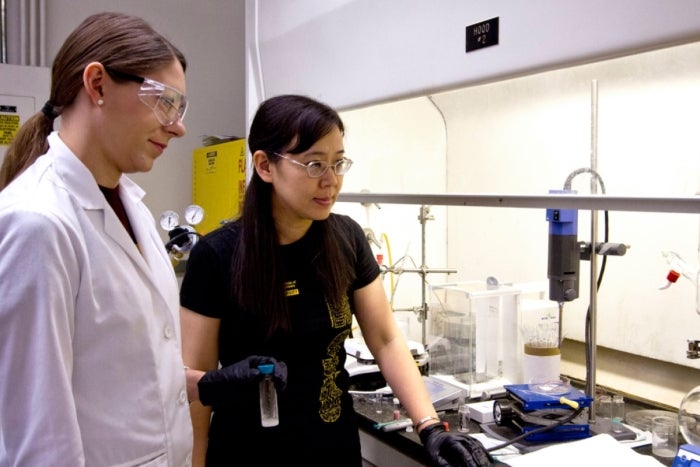ASU introduces trailblazing 'stackable microcredentials' pilot

Professor Kambhampati interacts with blocks and a robotic arm in the robotics and autonomous systems field research lab. Photo by Marco-Alexis Chaira
Arizona State University's Ira A. Fulton Schools of Engineering is at the forefront of transforming engineering and technology education through "stackable microcredentials."
These microcredentials address the urgent demand for adaptable upskilling and reskilling across engineering and technology fields, reflecting the dynamic nature of today's workforce requirements.
According to the World Economic Forum, in an era where job skills expire in less than five years, and technical expertise deteriorates even faster, stackable microcredentials offer a timely remedy.
The World Economic Forum’s 2020 Future of Jobs Report highlights that, by 2025, half of the global workforce will require reskilling, emphasizing the urgent necessity for ongoing learning and skill augmentation.
Stackable microcredentials enable individuals to stay competitive in today's job market by responding swiftly to industry demands and offering relevant skill development opportunities. By breaking learning into modular units, ASU makes professional development financially feasible, aligning with the evolving needs of employers who value employees with up-to-date skills.
"Intel is proud to support ASU's development of stackable microcredentials as an innovative approach to addressing the growing demand for skilled professionals in microelectronics. By providing individuals with accessible pathways to acquire essential skills, we are not only empowering them to thrive in their careers but also fostering innovation and driving economic growth," said Aziz Safa, vice president of analytics and automation at Intel.
Through this pilot program, learners will earn badges and microbadges that serve as tangible symbols of learners' proficiency and achievement. By taking a recommended series of courses, individuals can earn a badge, or by successfully completing a single course, they will earn a microbadge.
These courses enable learners to break down learning into manageable tasks, fostering expertise in specific areas or progress toward larger certifications, which allows for rapid recognition of knowledge and skills that enhance both resumes and career prospects.
Registration open
Registration is now open for stackable microcredentials, with offerings kicking off on Friday, March 15, and additional badges coming soon across microelectronics, manufacturing, robotics and more.
The pilot program offers a comprehensive array of skills vital for success in manufacturing fields. Through this initiative, learners have the opportunity to tap into faculty expertise in smart manufacturing and gain essential professional skills required in technical fields.
Upcoming microcredential offerings
In the "Industrial Internet of Things (IIoT) with MQTT Protocol" badge, taught by Binil Starly, professor and director of the School of Manufacturing Systems and Networks, participants delve into hands-on learning, gaining proficiency in IIoT protocols and integration. They explore topics such as IIoT technology management, MQTT implementation and smart manufacturing integration, preparing them for the complexities of modern industry.
Similarly, the "Microcontroller Applications: Programming and Electrical Basics to Integration" badge, taught by Assistant Teaching Professor Daniel Frank, provides learners with the knowledge and tools to harness the power of microcontrollers. From simulating circuits to creating real-world solutions like assistive technology prototypes, learners will develop a deep understanding of microcontroller functionality and application.
Complementing these technical offerings, the "Daily Communication Toolkit for Engineers" microbadge, taught by Assistant Teaching Professor Ali Kucukozyigit, will focus on enhancing communication skills tailored specifically for technical roles. Participants learn professional writing techniques, master the art of delivering impactful presentations and acquire effective time management strategies — all essential skills for success in today's engineering landscape.
Together, these microcredential offerings are designed to empower learners with the multidisciplinary skills needed to excel in diverse engineering environments.
More opportunities
This is just one more way ASU is living out its charter to make learning accessible to all. Through ASU’s Learning Enterprise, these stackable microcredentials, along with certifications and a range of courses, are available for those looking to upskill in high-demand technical and professional areas.
More Science and technology

Breakthrough copper alloy achieves unprecedented high-temperature performance
A team of researchers from Arizona State University, the U.S. Army Research Laboratory, Lehigh University and Louisiana State University has developed a groundbreaking high-temperature copper alloy…

4 ASU researchers named senior members of the National Academy of Inventors
The National Academy of Inventors recently named four Arizona State University researchers as senior members to the prestigious organization.Professor Qiang Chen and associate professors Matthew…

Transforming Arizona’s highways for a smoother drive
Imagine you’re driving down a smooth stretch of road. Your tires have firm traction. There are no potholes you need to swerve to avoid. Your suspension feels responsive. You’re relaxed and focused on…


